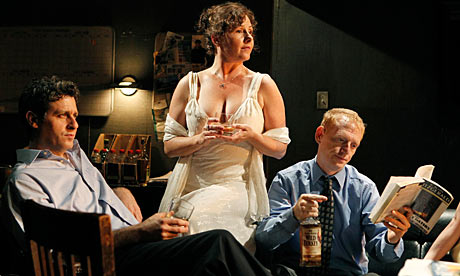
"Adapt or die," the saying goes. When it comes to theatre, however, the reverse is very often true: death by adaptation. A glance through the theatre listings reveals a number of familiar titles. In London, long-running adaptations of Michael Morpurgo and John Buchan, have, more recently, been joined by E Nesbit, Franz Kafka and Sebastian Faulks.
I've written before about the pressures adaptations face in subscribing to the imagery of the original. But there are further traps: Rachel Wagstaff's adaptation of Birdsong drew murmurs of discontent from the critics, with Susannah Clapp regarding it less as a dramatisation than a reading; her underlying message being that adaptations must heed the rules and conventions of their new medium, fashioning the original into an entirely new shape without losing sight of it. In other words, they must go native.
But, as Michael Billington notes, Faulks himself compared any attempt at transposition to "trying to turn a painting into a sculpture". Changing the form, he suggests, alters the content, perhaps even to the extent of losing the essential heart of the original. An impossible task, according to this argument.
All of this, however, suggests a very narrow view of theatre. Adaptations, from this perspective, merely repackage the original, removing the stuffing in order to fit the mould of neat, two-act drama with all the exposition and climaxes in the right places.
On a recent trip to New York, I managed to catch Gatz, Elevator Repair Service's verbatim version of F Scott Fitzgerald's novel The Great Gatsby. Over seven hours of stage time, not one of Fitzgerald's words is left out. Almost everything about Gatz feels ungainly and counter-intuitive. It seems overlong and, given the rhythm and structure of Fitzgerald's text, often undramatic. Plays are traditionally closed systems – guns seen in the first act go off in the third – but Gatz sprawls and meanders through a sequence of events. Characters appear, fail to move the plot forward and never return. The text, in other words, is left deliberately ill-fitted for the stage, often running counter to theatre's oldest rule: show, don't tell.
But Gatz never feels anything less than theatrical. By refusing to make textual amendments, it retains the qualities, form and feel of a novel. But its brilliance as theatre stems largely from the difficulties of – and failures in – staging it as such. Characters that are sketched so concisely on the page become odd creatures on stage: their distinguishing features embodied with crude gurns and tics. And how does one enact sentences such as: "A tiny gust of powder rose from her bosom?"
In other words, by embracing the irreconcilability of novel and stage, smashing the two together awkwardly, Gatz sheds light on both. You come to understand the novel's construction and the process of reading it, and learn about the mechanics of theatre. Gatz, I think, succeeds for two reasons: first, its defiance of the habitual conventions of "good drama", and second, by admitting the very process of adaptation. Aspiring adapters could do worse than heed those lessons. After all, just because a story can't be squeezed into the shape of a well-made play, doesn't mean it's not fit for the stage.

